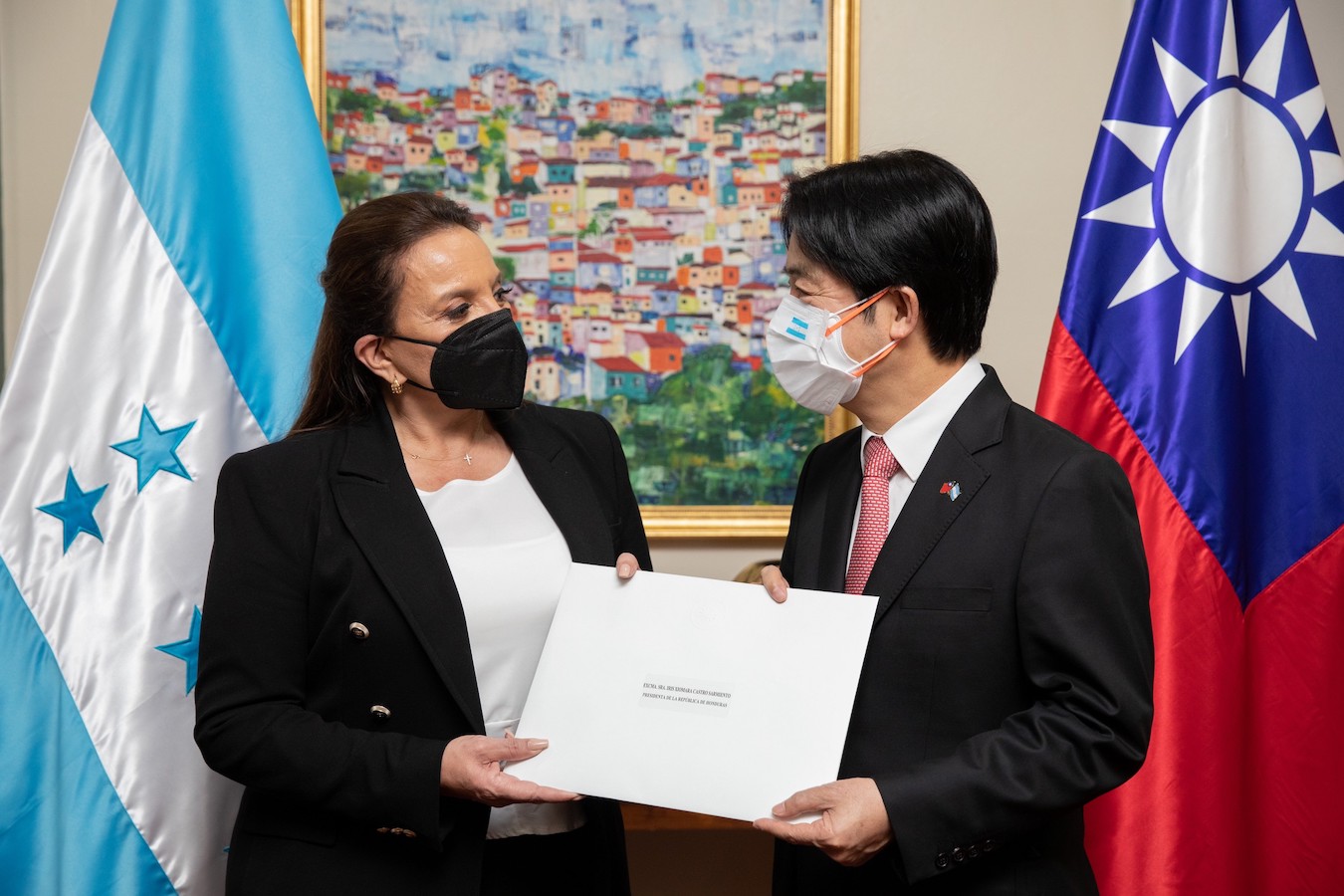by Brian Hioe
語言:
English
Photo Credit: Palácio do Planalto/Flickr/CC BY 2.0
HONDURAN PRESIDENT Xiomara Castro surprised last week with a tweet announcing that she had instructed her country’s foreign ministry to begin the process of switching recognition to China. This would mean that Taiwan loses one of its diplomatic allies shortly before a planned trip to visit Central American allies by President Tsai Ing-wen, which would involve a stopover in the US. It is expected that Tsai will speak at the Hudson Institute and meet with US Speaker of the House Kevin McCarthy as part of this trip.
This means that Taiwan only has thirteen official diplomatic allies remaining, if Castro goes through with the move. Honduras itself claims that these actions are because Taiwan did not follow up on increasing subsidies to China.
It was previously thought that Castro could perhaps break ties with Taiwan after her victory in November 2021. Castro suggested during campaigning that she would break ties with Taiwan to establish ties with China instead, but reversed course on the idea, responding positively to a tweet from Tsai congratulating her. Castro also invited Tsai to attend her presidential inauguration, with vice president William Lai eventually sent to attend on her behalf.
 Taiwanese president Tsai Ing-wen. Photo credit: Tsai Ing-wen/Facebook
Taiwanese president Tsai Ing-wen. Photo credit: Tsai Ing-wen/Facebook
Shortly before the election, with expectations that Castro could break ties with Taiwan, outgoing president Juan Orlando Hernandez made an unexpected trip to Taiwan in November 2021. It was unclear as to why Hernandez made the trip, which may have been to shore up support for his National Party before the elections that put Castro in power through a show of ties with Taiwan. Hernandez claimed that part of the reason for his visit was to seek Taiwanese investment for a mega-port development project on Tiger Island in the Gulf of Fonseca. During the visit, Hernandez also visited the offices of the Central American Bank for Economic Integration, a Honduran-led development bank in Taiwan. Otherwise, it is possible that Hernandez was hoping for support for the US, and angling for this by visiting Taiwan.
Indeed, the Hernandez trip repeated a pattern also seen with Paraguay more recently. Paraguayan president Mario Abdo Benitez visited Taiwan in February. It is thought that Paraguay could switch ties in April following presidential elections, if Authentic Radical Liberal Party candidate Pedro Efraín Alegre Sasiain wins, based on a campaign pledge. By contrast, the candidate of Benitez’ Colorado Party, Santiago Pena, stated that he would maintain ties with Taiwan.
In particular, Hernandez won reelection in 2017 in an election that many international observers viewed as stolen, due to widespread election fraud. At the same time, Taiwan congratulated Hernandez anyway. This occurs, ironically enough, despite that Taiwan itself has a long history of election fraud and vote buying, which had to be overcome in the process of democratization.
Taiwan is larger than all of its diplomatic allies, both in terms of the size of its population and economy. Many of these countries are led by regimes with questionable human rights records, which included Honduras under Hernandez. Apart from the killings of journalists and activists, Hernandez has faced charges over links to drug traffickers.
Castro’s announcement may not surprise given prior intimations by Castro that she might switch recognition. Despite backing down from her pledge to switch recognition to China once elected, her husband, former president Manuel Zelaya, still advocated for switching recognition to China.
Zelaya and Castro’s left-wing views may contribute to the desire to repivot toward China, with Zelaya having aligned Honduras with Hugo Chavez’s Venezuela during his presidency from 2006 until 2009, following which was ousted by a coup.
 Honduran president Xiomara Castro (left) and vice president William Lai (right). Photo credit: Presidential Office/Flickr/CC BY 2.0
Honduran president Xiomara Castro (left) and vice president William Lai (right). Photo credit: Presidential Office/Flickr/CC BY 2.0
Yet the decision is probably made on the basis of a calculation that it is more in Honduras’ interests to align with not only China over Taiwan, but China over the US. It is well-known internationally, of course, that the US is Taiwan’s backer, to the extent that Eastern European and Central European countries facing geopolitical threats from Russia signaled alignment with the US, western Europe, and NATO through vaccine donations and other shows of diplomatic support directed at Taiwan–this taking place at a time before the invasion of Ukraine.
The timing of the announcement proves sensitive, seeing as this takes place shortly before Tsai’s trip. In the meantime, other remaining Central American allies of Taiwan, such as Guatemala, have announced support for Taiwan. According to the Taiwanese government, there are no plans to hold a summit of Taiwan’s allies announced by Guatemala’s representative to Taiwan during this trip, however.
It is to be seen if Castro backs down from the move due to US pressure, with the US possibly expected to take action in line with the TAIPEI Act. US Special Presidential Advisor for the Americas Ed Dodd is expected to meet with Castro in the near future, perhaps hoping to deter Honduras from following through. But it is possible that Honduras’ actions are, in this light, a negotiating tactic with the US and Taiwan.

